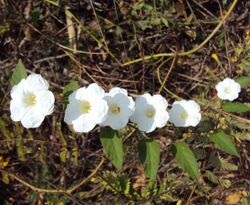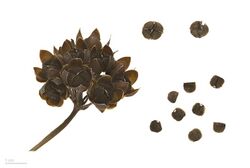Short description
Camonea umbellata
Scientific classification
Kingdom:
Plantae
Clade :
Tracheophytes
Clade :
Angiosperms
Clade :
Eudicots
Clade :
Asterids
Order:
Solanales
Family:
Convolvulaceae
Genus:
Camonea
Species:
C. umbellata
Binomial name
Camonea umbellata (
L. ) A.R.Simões & Staples
Synonyms
List
Camonea bifida (Vahl) Raf. Convolvulus aristolochiifolius Mill. Convolvulus bifidus Vahl Convolvulus blandus Roxb. Convolvulus caliginosus J.Koenig ex Choisy Convolvulus caracassanus Willd. ex Roem. & Schult. Convolvulus cymosus Desr. Convolvulus densiflorus Hook. & Arn. Convolvulus flavus Salisb. Convolvulus lotnoha Buch.-Ham. ex Wall. Convolvulus luteus M. Martens & Galeotti Convolvulus multiflorus Mill. Convolvulus pentagonus Roxb. Convolvulus rothii (Schult.) Spreng. Convolvulus sagittifer Kunth Convolvulus triflorus Vahl Convolvulus umbellatus Sessé & Moc. Convolvulus umbellatus L. Ipomoea bifida Roem. & Schult. Ipomoea blanda (Roxb.) Sweet Ipomoea caliginosa Choisy Ipomoea cymosa (Desr.) Roem. & Schult. Ipomoea fulvicoma Hance Ipomoea heynei Roem. & Schult. Ipomoea longipes Garcke Ipomoea micans Garcke Ipomoea mollicoma Miq. Ipomoea multiflora (Mill.) Roem. & Schult. Ipomoea pentagona Sweet Ipomoea polyanthes Roem. & Schult. Ipomoea portobellensis Beurl. Ipomoea primuliflora G.Don Ipomoea rothii Roem. & Schult. Ipomoea sagittifer (Kunth) G.Don Ipomoea tonkinensis Gagnep. Ipomoea triantha Roem. & Schult. Ipomoea umbellata (L.) G.Mey. Latrienda multiflora (Mill.) Raf. Merremia rondoniana Hoehne Merremia umbellata (L. ) Hallier f.
Merremia umbellata ssp umbellata - MHNTCamonea umbellata hogvine , yellow merremia , and yellow wood rose , is a thin vine growing to a maximum thickness of 2 cm (0.79 in). It has many uses in Indian traditional medicines.[ 1] [ 2]
References
External links
Wikidata ☰ Q7403044 entry
Original source: https://en.wikipedia.org/wiki/Camonea umbellata. Read more



